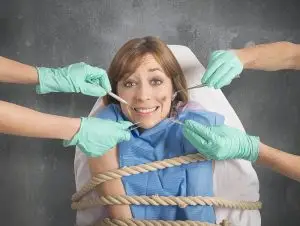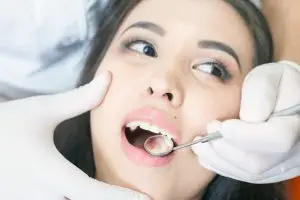Do you get nervous when you think about going to the dentist? Do you avoid appointments or tell yourself the problems with your mouth are “no big deal” instead of going to a cleaning or having your teeth looked at? You’re not alone, and you might have dentophobia.
Understanding Dentophobia
 A lot of people are a little nervous before an appointment with their dentist. Some people become extremely anxious. Dentophobia occurs when you’re irrationally or extremely afraid of going to the dentist, dentists in general, or dental procedures. Another term for this kind of fear is odontophobia.
A lot of people are a little nervous before an appointment with their dentist. Some people become extremely anxious. Dentophobia occurs when you’re irrationally or extremely afraid of going to the dentist, dentists in general, or dental procedures. Another term for this kind of fear is odontophobia.
It’s estimated that between five and 15 percent of people may have some form of dentophobia. This means that millions of other patients may be just as nervous and scared as you are. If you’re afraid to see a dentist, walk into the office, or sit down in the chair, you’re not alone.
Other Dental Fears and Dentophobia
 Dentophobia is the technical term that usually encompasses all dental fears. When you’re afraid to go to the dentist for any reason, it might be classified as dentophobia. In reality, you may have a very specific fear that relates to dental work but doesn’t just show up during a scheduled cleaning.
Dentophobia is the technical term that usually encompasses all dental fears. When you’re afraid to go to the dentist for any reason, it might be classified as dentophobia. In reality, you may have a very specific fear that relates to dental work but doesn’t just show up during a scheduled cleaning.
- Fear of pain: This is usually brought on by past experiences at the dentist’s office. Today, we can make sure there’s very little discomfort for patients, either through numbing medications or dental sedation.
- Fear of needles: This is known as trypanophobia, and it doesn’t just impact dental patients. If you’re afraid of needles, it can cause problems at the doctor’s office, too.
- Fear of drills: This one is usually unique to a dental cleaning, but it could be related to the noise or other types of fears listed below.
- Fear of gagging: Some patients have legitimate concerns about their gag reflex. Your dentist can work with you to minimize your concerns or the probability that you may gag.
- Fear of numbness: Not being about to feel a part of their body can create a lot of anxiety for people. It makes them feel out of control or that they don’t know what might happen next.
- Fear of anyone being too physically close to you
- Fear of being out of control and not being able to move
While these fears aren’t always specific to the dentist, they can definitely contribute to your dentophobia. Some patients have multiple fears and anxieties while others may only focus on a single thing. You may have had a bad experience as a child that stuck with you or you may have been raised by a parent who was afraid of the dentist.
How to Stop Being Afraid of the Dentist
 A deep fear or phobia is not something that most patients can easily get over. Some well-meaning family member or friend might just tell you to “stop worrying” but you know it’s not that easy. You may never get over your dentophobia completely, but there are tools to help you.
A deep fear or phobia is not something that most patients can easily get over. Some well-meaning family member or friend might just tell you to “stop worrying” but you know it’s not that easy. You may never get over your dentophobia completely, but there are tools to help you.
Dental sedation: While not dealing directly with your fear of the dentist, sedation allows you to relax and take your focus off the procedure. For severe anxiety and fears or invasive procedures, sleep dentistry or IV sedation may be exactly what you need.
Therapy: Some studies show that cognitive behavior therapy (CBT) can help you address your anxieties and fears. While this may not alleviate them completely, therapy can give you the coping mechanisms to better handle your fears so they don’t control your life.
Talk to your dentist: Even small fears or worries can be helped if your dentist knows about them. A good dentist will do what is necessary to make you comfortable and can offer solutions. Sometimes all you need is a little bit of nitrous oxide or a break during longer procedures. If you let your dentist know about your fears, they can provide the care that helps you best.
Conclusion
If you’re afraid of the dentist, you’re not alone. Dentophobia is more common than you realize. Being scared doesn’t mean you should skip your cleanings and checkups. What you need is a dentist in Phoenix or Mesa who can work with you and offer solutions so you can work around your fears to get the dental care you need.
